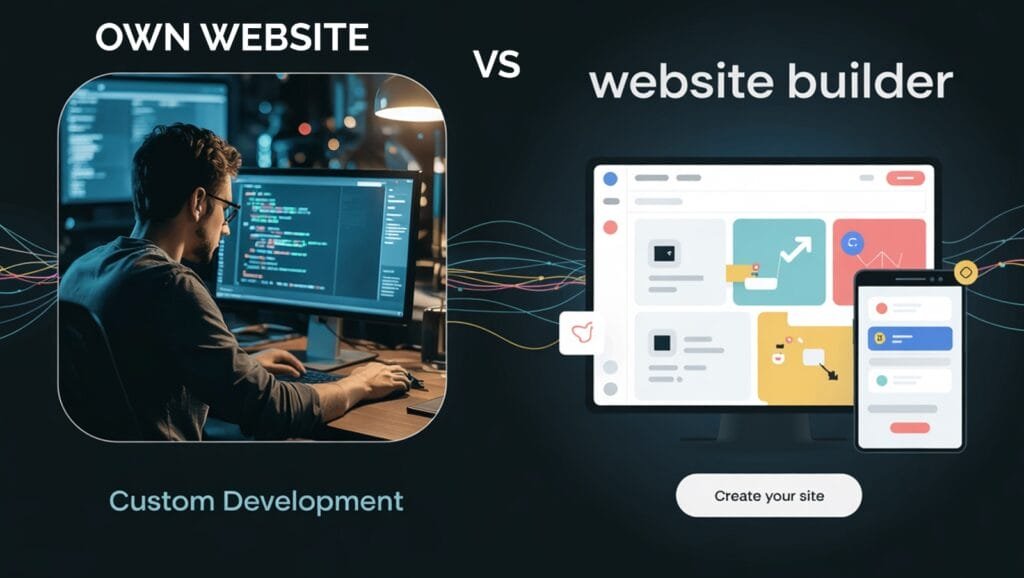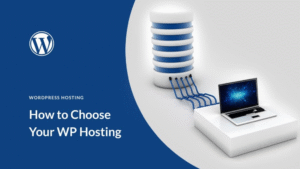Creating a website is one of the first steps to establishing your presence online—whether it’s for your business, personal brand, or blog. But when you’re ready to build one, you’re often faced with a big question: Should you Build your own website or website builder?
There’s no one-size-fits-all answer. The right choice depends on your goals, technical skills, time, and budget. In this article, we’ll break down both options, weigh the pros and cons, and help you decide what works best for you.
What It Means to Build Your Own Website
When we talk about “building your own website,” we’re usually referring to creating it from scratch using tools like HTML, CSS, JavaScript, or a CMS like WordPress. This gives you full control over how your site looks, functions, and grows.
Pros
- Complete customization: You have the freedom to design every part of your website.
- Scalability: It’s easier to expand and add complex features as your business grows.
- Full ownership: You control the code, content, and hosting—nothing is locked into a third-party platform.
- Better SEO control: You can fully optimize technical SEO elements like schema markup, structured URLs, and site speed.
Cons
- Requires technical skills: You’ll need to know how to code or hire someone who does.
- Higher upfront cost: Domain, hosting, themes, and developer fees can add up.
- Takes more time: It can take days or even weeks to get everything up and running.
What a Website Builder Offers
Website builders like Wix, Squarespace, Shopify, and Webflow are designed for ease. You pick a template, drag and drop elements, and publish your site—no coding needed.
Pros
- Beginner-friendly: Ideal if you’ve never built a website before.
- Quick to launch: You can go live within hours.
- All-in-one platform: Hosting, design, and support are included.
- Modern templates: Many builders offer clean, mobile-optimized designs.
Cons
- Limited flexibility: You can only use what the builder allows.
- Monthly fees: You pay ongoing subscription costs.
- SEO limitations: You won’t have access to advanced SEO features on every platform.
- Harder to migrate: Switching to another platform later can be a pain.
Build Your Own Website vs Use a Website Builder: Which Is Better for SEO?
Here’s where things get interesting, especially if you care about visibility on Google. If you’re serious about long-term search engine performance, this comparison matters.
Why Building Your Own Site Is Better for SEO
- Clean, customizable code
- Optimized site speed
- Customizable meta titles, descriptions, and URLs
- Easier integration with tools like RankMath SEO for WordPress
- Better support for advanced schema and structured data
SEO Challenges with Website Builders
While platforms like Webflow and Wix are improving their SEO tools, most website builders still come with limitations:
- You may not be able to control your URL structure fully.
- Some load unnecessary scripts, slowing down your site.
- Custom schema markup may not be supported.
Still, with the right platform and SEO strategy, a website builder can still rank well—especially for local businesses or personal brands with low competition.
Cost Breakdown: Builder vs Custom Site
| Feature | Build Your Own Website | Website Builder |
| Domain Name | $10–$15/year | Often included in the plan |
| Web Hosting | $3–$10/month | Included in subscription |
| Design/Theme | Free – $100+ or custom fees | Included in most plans |
| Development | $0 (DIY) to $1000+ (if hiring a developer) | Not required |
| Plugins/Extensions | Free – $200/year (e.g., SEO, security tools) | Built-in or included in premium plans |
| Maintenance & Updates | DIY or pay for help (cost varies) | Handled by the platform |
| Security (SSL) | Free – $50/year (or included with hosting) | Usually included |
| Email Hosting | $1–$5/month (if separate) | Some platforms include it, others don’t |
| Ongoing Costs | Lower over time (after setup) | Recurring monthly/yearly subscription fees |
| Estimated Monthly Cost | $5–$50/month depending on setup | $10–$50/month |
Who Should Choose a Website Builder?
Go with a website builder if:
- You need a site up and running fast
- You have zero technical knowledge
- You’re starting a personal blog, portfolio, or small business website
- You want to avoid the hassle of managing hosting and security
Recommended Website Builders
- Wix: Great for service businesses and personal portfolios
- Squarespace: Perfect for creatives and visual-heavy sites
- Shopify: The top choice for eCommerce
- Webflow: Offers design flexibility and better SEO options
Who Should Build Their Own Website?
This path is best if:
- You want full creative and technical control
- You plan to scale your website over time
- You’re comfortable with code (or hiring a developer)
- SEO is a top priority
- You don’t want to rely on one platform forever
Best Tools to Use
- WordPress + RankMath: Powerful for SEO and blogging
- Bootstrap or Tailwind CSS: Build responsive designs faster
- VS Code or Sublime Text: Great code editors
- Google Search Console: Monitor performance in search results
Final Thoughts: Which Option Is Right for You?
Let’s circle back to the key question: Is it better to build your own website or use a website builder? It really depends on what you’re trying to achieve.
- If you want ease, speed, and simplicity → Website builder is your friend
- If you want control, growth potential, and better SEO → Build it yourself
For many people, starting with a website builder is a great way to get online quickly. Later, when your business grows or your needs become more complex, you can transition to a custom-built website.
FAQs
Can I switch from a builder to a custom site later?
Yes, but it’s not always easy. You may need to manually transfer content and rebuild design elements.
Are website builders good for SEO?
Some are better than others. Webflow and Wix have decent SEO tools. But for full SEO control, WordPress with RankMath is a better long-term option.
Which is cheaper in the long run?
A custom-built site can be more cost-effective over time, especially if you manage it yourself.




